Professional Identity and Practice
VerifiedAdded on 2023/01/12
|12
|3388
|25
AI Summary
This report explores the importance of ongoing professional development and self-directed learning in enhancing professional identity and practice. It examines the benefits of ongoing professional development for both employers and employees, investigates professional employer expectations of skills and competencies, and assesses own abilities, skills, and competencies for a specific job role. The report also reviews a range of learning theories and approaches used in personal and professional development.
Contribute Materials
Your contribution can guide someone’s learning journey. Share your
documents today.
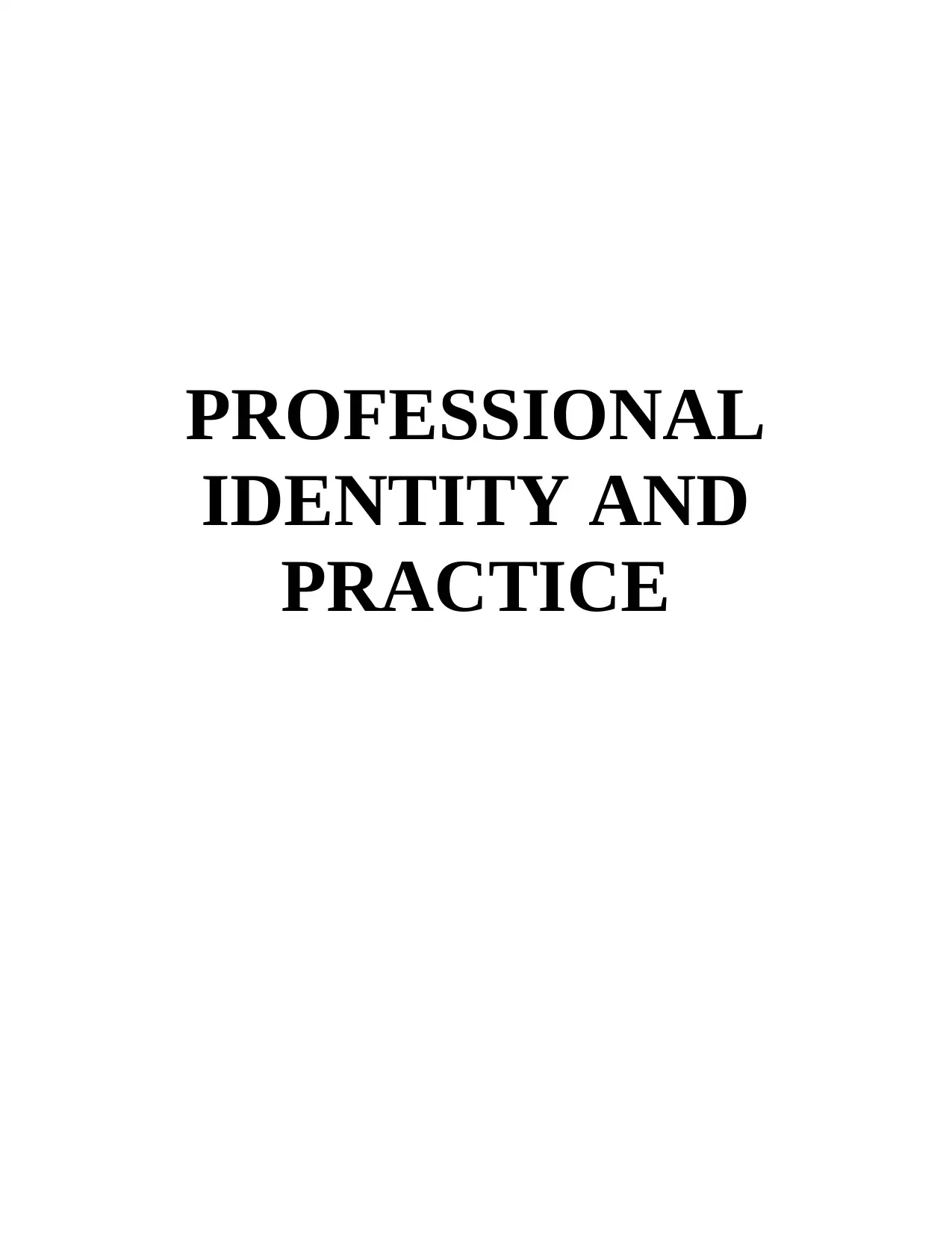
PROFESSIONAL
IDENTITY AND
PRACTICE
IDENTITY AND
PRACTICE
Secure Best Marks with AI Grader
Need help grading? Try our AI Grader for instant feedback on your assignments.
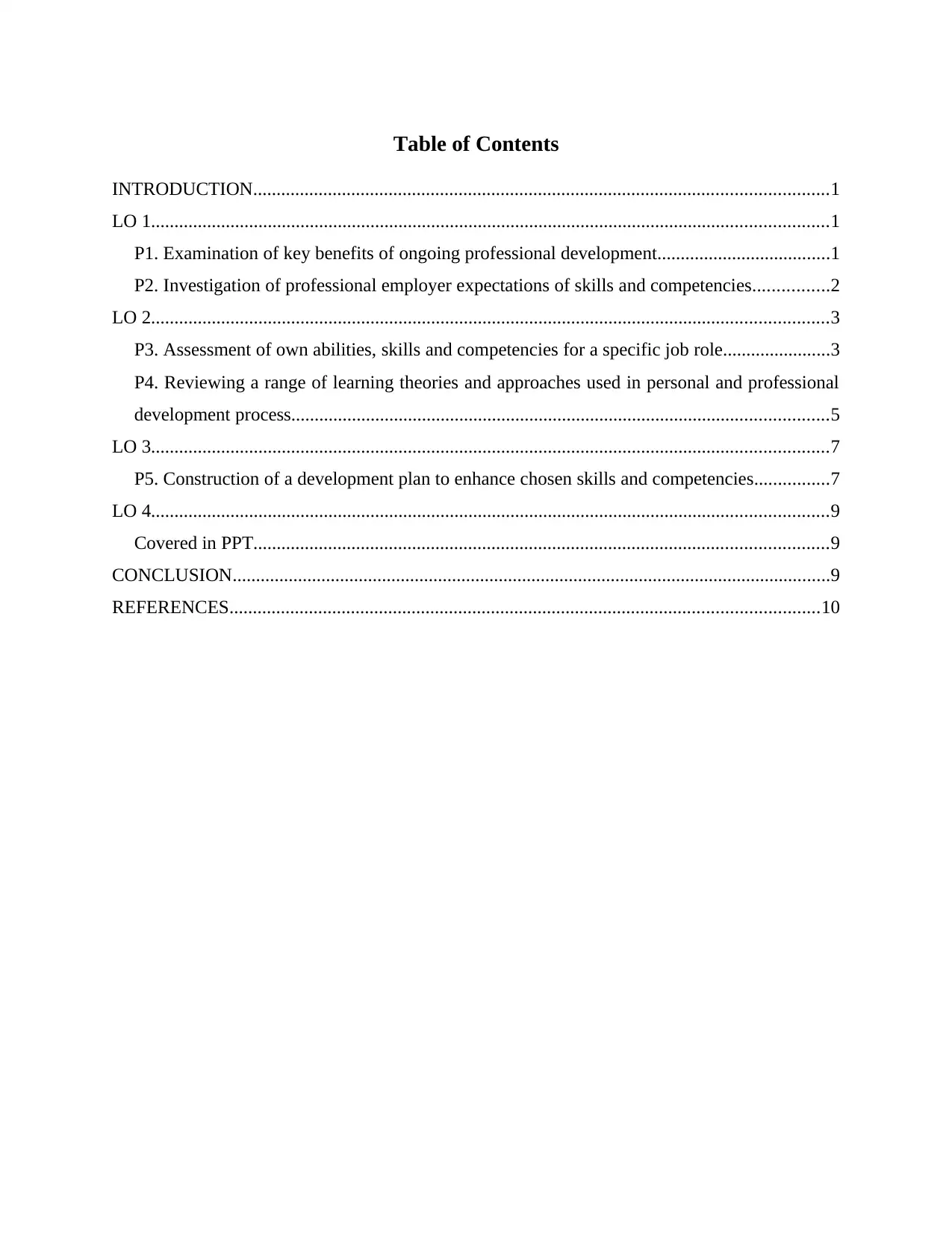
Table of Contents
INTRODUCTION...........................................................................................................................1
LO 1.................................................................................................................................................1
P1. Examination of key benefits of ongoing professional development.....................................1
P2. Investigation of professional employer expectations of skills and competencies................2
LO 2.................................................................................................................................................3
P3. Assessment of own abilities, skills and competencies for a specific job role.......................3
P4. Reviewing a range of learning theories and approaches used in personal and professional
development process...................................................................................................................5
LO 3.................................................................................................................................................7
P5. Construction of a development plan to enhance chosen skills and competencies................7
LO 4.................................................................................................................................................9
Covered in PPT...........................................................................................................................9
CONCLUSION................................................................................................................................9
REFERENCES..............................................................................................................................10
INTRODUCTION...........................................................................................................................1
LO 1.................................................................................................................................................1
P1. Examination of key benefits of ongoing professional development.....................................1
P2. Investigation of professional employer expectations of skills and competencies................2
LO 2.................................................................................................................................................3
P3. Assessment of own abilities, skills and competencies for a specific job role.......................3
P4. Reviewing a range of learning theories and approaches used in personal and professional
development process...................................................................................................................5
LO 3.................................................................................................................................................7
P5. Construction of a development plan to enhance chosen skills and competencies................7
LO 4.................................................................................................................................................9
Covered in PPT...........................................................................................................................9
CONCLUSION................................................................................................................................9
REFERENCES..............................................................................................................................10
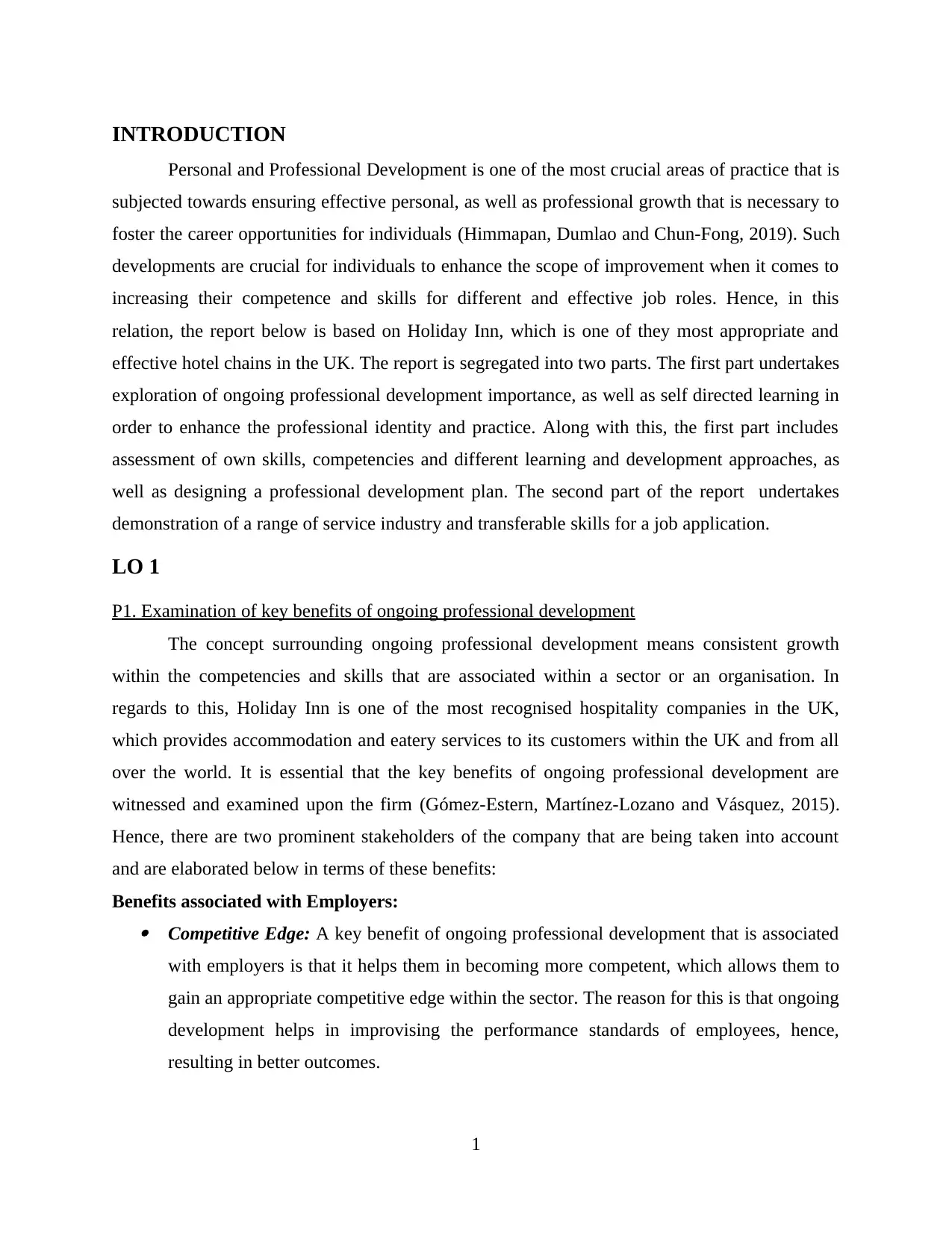
INTRODUCTION
Personal and Professional Development is one of the most crucial areas of practice that is
subjected towards ensuring effective personal, as well as professional growth that is necessary to
foster the career opportunities for individuals (Himmapan, Dumlao and Chun-Fong, 2019). Such
developments are crucial for individuals to enhance the scope of improvement when it comes to
increasing their competence and skills for different and effective job roles. Hence, in this
relation, the report below is based on Holiday Inn, which is one of they most appropriate and
effective hotel chains in the UK. The report is segregated into two parts. The first part undertakes
exploration of ongoing professional development importance, as well as self directed learning in
order to enhance the professional identity and practice. Along with this, the first part includes
assessment of own skills, competencies and different learning and development approaches, as
well as designing a professional development plan. The second part of the report undertakes
demonstration of a range of service industry and transferable skills for a job application.
LO 1
P1. Examination of key benefits of ongoing professional development
The concept surrounding ongoing professional development means consistent growth
within the competencies and skills that are associated within a sector or an organisation. In
regards to this, Holiday Inn is one of the most recognised hospitality companies in the UK,
which provides accommodation and eatery services to its customers within the UK and from all
over the world. It is essential that the key benefits of ongoing professional development are
witnessed and examined upon the firm (Gómez-Estern, Martínez-Lozano and Vásquez, 2015).
Hence, there are two prominent stakeholders of the company that are being taken into account
and are elaborated below in terms of these benefits:
Benefits associated with Employers: Competitive Edge: A key benefit of ongoing professional development that is associated
with employers is that it helps them in becoming more competent, which allows them to
gain an appropriate competitive edge within the sector. The reason for this is that ongoing
development helps in improvising the performance standards of employees, hence,
resulting in better outcomes.
1
Personal and Professional Development is one of the most crucial areas of practice that is
subjected towards ensuring effective personal, as well as professional growth that is necessary to
foster the career opportunities for individuals (Himmapan, Dumlao and Chun-Fong, 2019). Such
developments are crucial for individuals to enhance the scope of improvement when it comes to
increasing their competence and skills for different and effective job roles. Hence, in this
relation, the report below is based on Holiday Inn, which is one of they most appropriate and
effective hotel chains in the UK. The report is segregated into two parts. The first part undertakes
exploration of ongoing professional development importance, as well as self directed learning in
order to enhance the professional identity and practice. Along with this, the first part includes
assessment of own skills, competencies and different learning and development approaches, as
well as designing a professional development plan. The second part of the report undertakes
demonstration of a range of service industry and transferable skills for a job application.
LO 1
P1. Examination of key benefits of ongoing professional development
The concept surrounding ongoing professional development means consistent growth
within the competencies and skills that are associated within a sector or an organisation. In
regards to this, Holiday Inn is one of the most recognised hospitality companies in the UK,
which provides accommodation and eatery services to its customers within the UK and from all
over the world. It is essential that the key benefits of ongoing professional development are
witnessed and examined upon the firm (Gómez-Estern, Martínez-Lozano and Vásquez, 2015).
Hence, there are two prominent stakeholders of the company that are being taken into account
and are elaborated below in terms of these benefits:
Benefits associated with Employers: Competitive Edge: A key benefit of ongoing professional development that is associated
with employers is that it helps them in becoming more competent, which allows them to
gain an appropriate competitive edge within the sector. The reason for this is that ongoing
development helps in improvising the performance standards of employees, hence,
resulting in better outcomes.
1
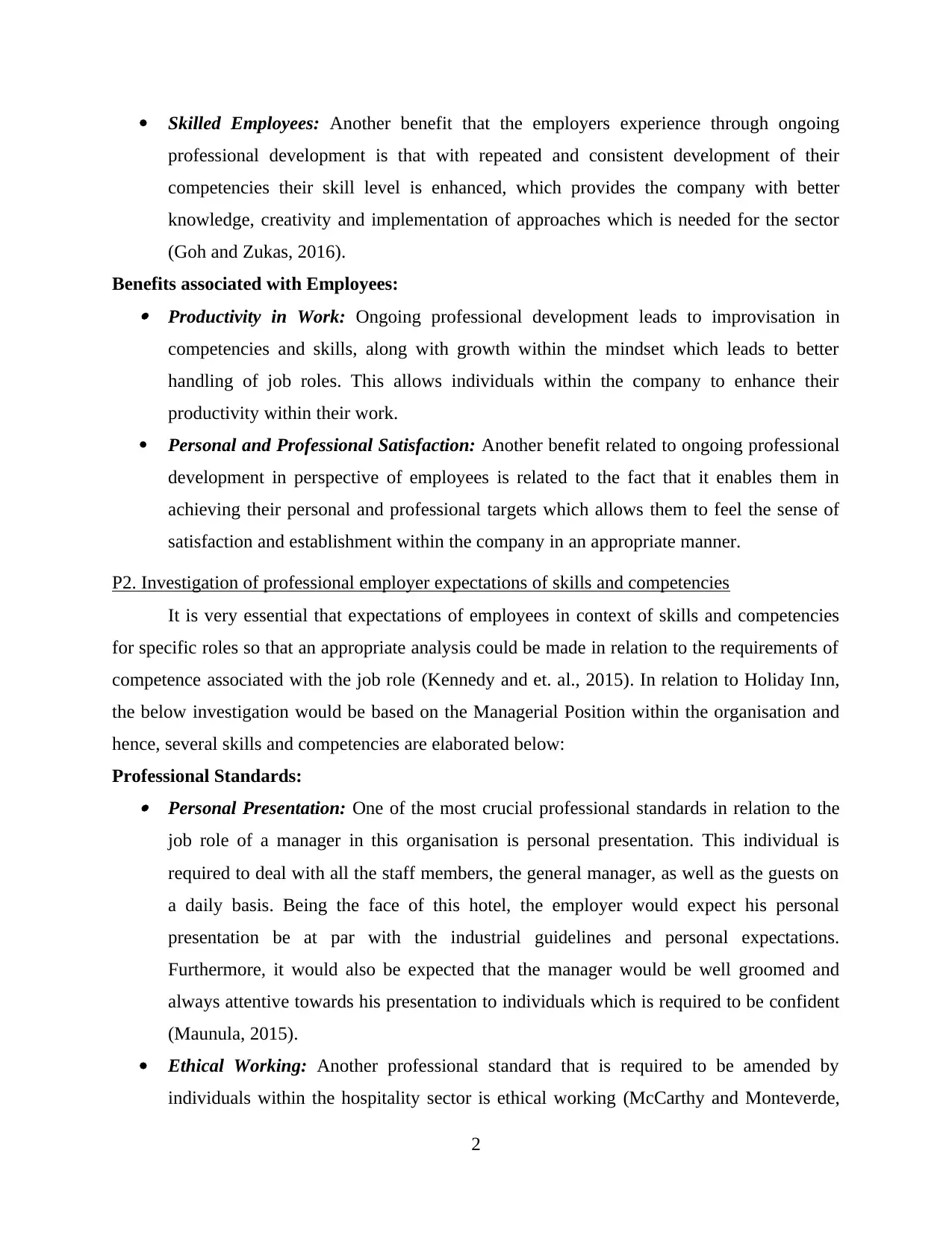
Skilled Employees: Another benefit that the employers experience through ongoing
professional development is that with repeated and consistent development of their
competencies their skill level is enhanced, which provides the company with better
knowledge, creativity and implementation of approaches which is needed for the sector
(Goh and Zukas, 2016).
Benefits associated with Employees: Productivity in Work: Ongoing professional development leads to improvisation in
competencies and skills, along with growth within the mindset which leads to better
handling of job roles. This allows individuals within the company to enhance their
productivity within their work.
Personal and Professional Satisfaction: Another benefit related to ongoing professional
development in perspective of employees is related to the fact that it enables them in
achieving their personal and professional targets which allows them to feel the sense of
satisfaction and establishment within the company in an appropriate manner.
P2. Investigation of professional employer expectations of skills and competencies
It is very essential that expectations of employees in context of skills and competencies
for specific roles so that an appropriate analysis could be made in relation to the requirements of
competence associated with the job role (Kennedy and et. al., 2015). In relation to Holiday Inn,
the below investigation would be based on the Managerial Position within the organisation and
hence, several skills and competencies are elaborated below:
Professional Standards: Personal Presentation: One of the most crucial professional standards in relation to the
job role of a manager in this organisation is personal presentation. This individual is
required to deal with all the staff members, the general manager, as well as the guests on
a daily basis. Being the face of this hotel, the employer would expect his personal
presentation be at par with the industrial guidelines and personal expectations.
Furthermore, it would also be expected that the manager would be well groomed and
always attentive towards his presentation to individuals which is required to be confident
(Maunula, 2015).
Ethical Working: Another professional standard that is required to be amended by
individuals within the hospitality sector is ethical working (McCarthy and Monteverde,
2
professional development is that with repeated and consistent development of their
competencies their skill level is enhanced, which provides the company with better
knowledge, creativity and implementation of approaches which is needed for the sector
(Goh and Zukas, 2016).
Benefits associated with Employees: Productivity in Work: Ongoing professional development leads to improvisation in
competencies and skills, along with growth within the mindset which leads to better
handling of job roles. This allows individuals within the company to enhance their
productivity within their work.
Personal and Professional Satisfaction: Another benefit related to ongoing professional
development in perspective of employees is related to the fact that it enables them in
achieving their personal and professional targets which allows them to feel the sense of
satisfaction and establishment within the company in an appropriate manner.
P2. Investigation of professional employer expectations of skills and competencies
It is very essential that expectations of employees in context of skills and competencies
for specific roles so that an appropriate analysis could be made in relation to the requirements of
competence associated with the job role (Kennedy and et. al., 2015). In relation to Holiday Inn,
the below investigation would be based on the Managerial Position within the organisation and
hence, several skills and competencies are elaborated below:
Professional Standards: Personal Presentation: One of the most crucial professional standards in relation to the
job role of a manager in this organisation is personal presentation. This individual is
required to deal with all the staff members, the general manager, as well as the guests on
a daily basis. Being the face of this hotel, the employer would expect his personal
presentation be at par with the industrial guidelines and personal expectations.
Furthermore, it would also be expected that the manager would be well groomed and
always attentive towards his presentation to individuals which is required to be confident
(Maunula, 2015).
Ethical Working: Another professional standard that is required to be amended by
individuals within the hospitality sector is ethical working (McCarthy and Monteverde,
2
Secure Best Marks with AI Grader
Need help grading? Try our AI Grader for instant feedback on your assignments.
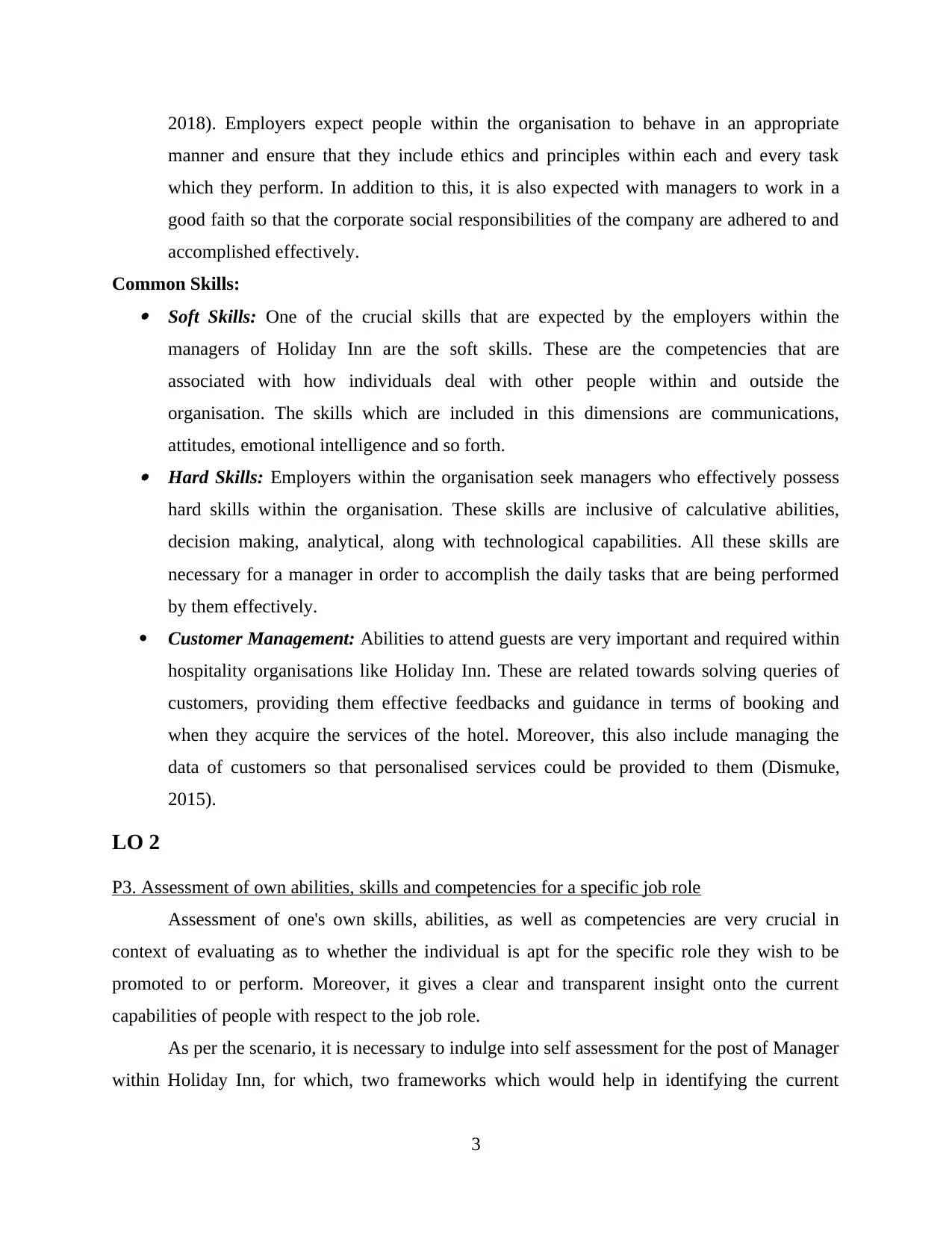
2018). Employers expect people within the organisation to behave in an appropriate
manner and ensure that they include ethics and principles within each and every task
which they perform. In addition to this, it is also expected with managers to work in a
good faith so that the corporate social responsibilities of the company are adhered to and
accomplished effectively.
Common Skills: Soft Skills: One of the crucial skills that are expected by the employers within the
managers of Holiday Inn are the soft skills. These are the competencies that are
associated with how individuals deal with other people within and outside the
organisation. The skills which are included in this dimensions are communications,
attitudes, emotional intelligence and so forth. Hard Skills: Employers within the organisation seek managers who effectively possess
hard skills within the organisation. These skills are inclusive of calculative abilities,
decision making, analytical, along with technological capabilities. All these skills are
necessary for a manager in order to accomplish the daily tasks that are being performed
by them effectively.
Customer Management: Abilities to attend guests are very important and required within
hospitality organisations like Holiday Inn. These are related towards solving queries of
customers, providing them effective feedbacks and guidance in terms of booking and
when they acquire the services of the hotel. Moreover, this also include managing the
data of customers so that personalised services could be provided to them (Dismuke,
2015).
LO 2
P3. Assessment of own abilities, skills and competencies for a specific job role
Assessment of one's own skills, abilities, as well as competencies are very crucial in
context of evaluating as to whether the individual is apt for the specific role they wish to be
promoted to or perform. Moreover, it gives a clear and transparent insight onto the current
capabilities of people with respect to the job role.
As per the scenario, it is necessary to indulge into self assessment for the post of Manager
within Holiday Inn, for which, two frameworks which would help in identifying the current
3
manner and ensure that they include ethics and principles within each and every task
which they perform. In addition to this, it is also expected with managers to work in a
good faith so that the corporate social responsibilities of the company are adhered to and
accomplished effectively.
Common Skills: Soft Skills: One of the crucial skills that are expected by the employers within the
managers of Holiday Inn are the soft skills. These are the competencies that are
associated with how individuals deal with other people within and outside the
organisation. The skills which are included in this dimensions are communications,
attitudes, emotional intelligence and so forth. Hard Skills: Employers within the organisation seek managers who effectively possess
hard skills within the organisation. These skills are inclusive of calculative abilities,
decision making, analytical, along with technological capabilities. All these skills are
necessary for a manager in order to accomplish the daily tasks that are being performed
by them effectively.
Customer Management: Abilities to attend guests are very important and required within
hospitality organisations like Holiday Inn. These are related towards solving queries of
customers, providing them effective feedbacks and guidance in terms of booking and
when they acquire the services of the hotel. Moreover, this also include managing the
data of customers so that personalised services could be provided to them (Dismuke,
2015).
LO 2
P3. Assessment of own abilities, skills and competencies for a specific job role
Assessment of one's own skills, abilities, as well as competencies are very crucial in
context of evaluating as to whether the individual is apt for the specific role they wish to be
promoted to or perform. Moreover, it gives a clear and transparent insight onto the current
capabilities of people with respect to the job role.
As per the scenario, it is necessary to indulge into self assessment for the post of Manager
within Holiday Inn, for which, two frameworks which would help in identifying the current
3
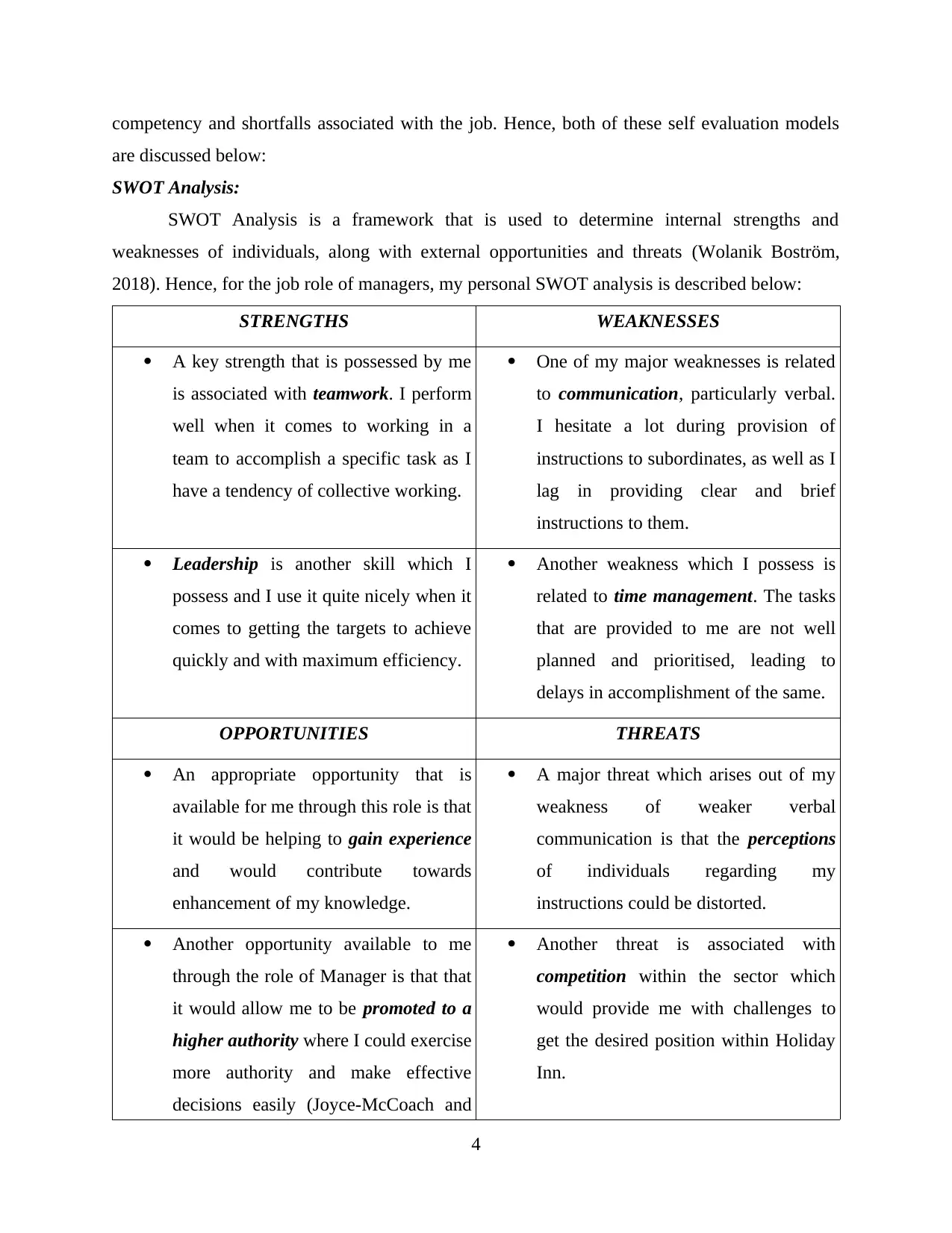
competency and shortfalls associated with the job. Hence, both of these self evaluation models
are discussed below:
SWOT Analysis:
SWOT Analysis is a framework that is used to determine internal strengths and
weaknesses of individuals, along with external opportunities and threats (Wolanik Boström,
2018). Hence, for the job role of managers, my personal SWOT analysis is described below:
STRENGTHS WEAKNESSES
A key strength that is possessed by me
is associated with teamwork. I perform
well when it comes to working in a
team to accomplish a specific task as I
have a tendency of collective working.
One of my major weaknesses is related
to communication, particularly verbal.
I hesitate a lot during provision of
instructions to subordinates, as well as I
lag in providing clear and brief
instructions to them.
Leadership is another skill which I
possess and I use it quite nicely when it
comes to getting the targets to achieve
quickly and with maximum efficiency.
Another weakness which I possess is
related to time management. The tasks
that are provided to me are not well
planned and prioritised, leading to
delays in accomplishment of the same.
OPPORTUNITIES THREATS
An appropriate opportunity that is
available for me through this role is that
it would be helping to gain experience
and would contribute towards
enhancement of my knowledge.
A major threat which arises out of my
weakness of weaker verbal
communication is that the perceptions
of individuals regarding my
instructions could be distorted.
Another opportunity available to me
through the role of Manager is that that
it would allow me to be promoted to a
higher authority where I could exercise
more authority and make effective
decisions easily (Joyce-McCoach and
Another threat is associated with
competition within the sector which
would provide me with challenges to
get the desired position within Holiday
Inn.
4
are discussed below:
SWOT Analysis:
SWOT Analysis is a framework that is used to determine internal strengths and
weaknesses of individuals, along with external opportunities and threats (Wolanik Boström,
2018). Hence, for the job role of managers, my personal SWOT analysis is described below:
STRENGTHS WEAKNESSES
A key strength that is possessed by me
is associated with teamwork. I perform
well when it comes to working in a
team to accomplish a specific task as I
have a tendency of collective working.
One of my major weaknesses is related
to communication, particularly verbal.
I hesitate a lot during provision of
instructions to subordinates, as well as I
lag in providing clear and brief
instructions to them.
Leadership is another skill which I
possess and I use it quite nicely when it
comes to getting the targets to achieve
quickly and with maximum efficiency.
Another weakness which I possess is
related to time management. The tasks
that are provided to me are not well
planned and prioritised, leading to
delays in accomplishment of the same.
OPPORTUNITIES THREATS
An appropriate opportunity that is
available for me through this role is that
it would be helping to gain experience
and would contribute towards
enhancement of my knowledge.
A major threat which arises out of my
weakness of weaker verbal
communication is that the perceptions
of individuals regarding my
instructions could be distorted.
Another opportunity available to me
through the role of Manager is that that
it would allow me to be promoted to a
higher authority where I could exercise
more authority and make effective
decisions easily (Joyce-McCoach and
Another threat is associated with
competition within the sector which
would provide me with challenges to
get the desired position within Holiday
Inn.
4
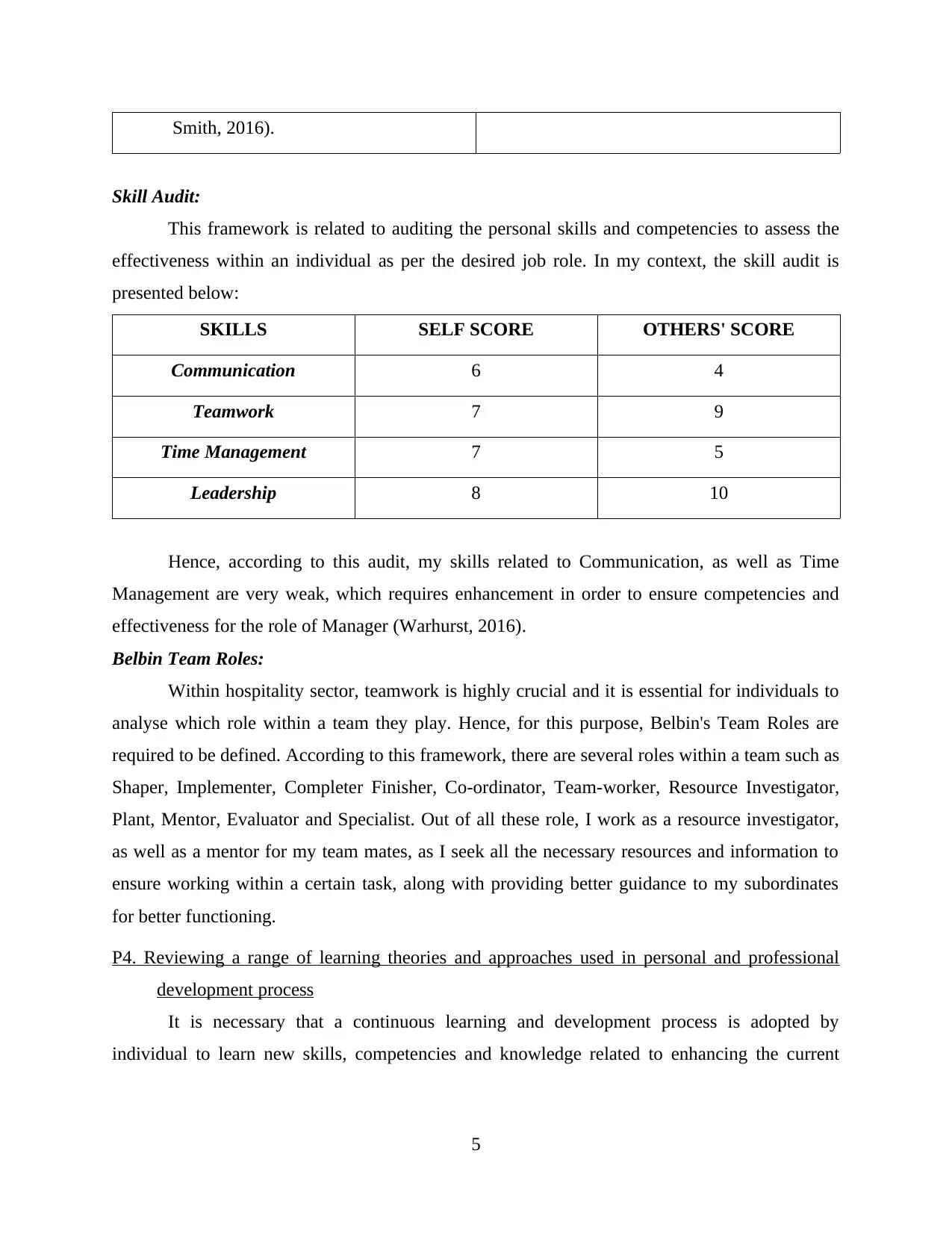
Smith, 2016).
Skill Audit:
This framework is related to auditing the personal skills and competencies to assess the
effectiveness within an individual as per the desired job role. In my context, the skill audit is
presented below:
SKILLS SELF SCORE OTHERS' SCORE
Communication 6 4
Teamwork 7 9
Time Management 7 5
Leadership 8 10
Hence, according to this audit, my skills related to Communication, as well as Time
Management are very weak, which requires enhancement in order to ensure competencies and
effectiveness for the role of Manager (Warhurst, 2016).
Belbin Team Roles:
Within hospitality sector, teamwork is highly crucial and it is essential for individuals to
analyse which role within a team they play. Hence, for this purpose, Belbin's Team Roles are
required to be defined. According to this framework, there are several roles within a team such as
Shaper, Implementer, Completer Finisher, Co-ordinator, Team-worker, Resource Investigator,
Plant, Mentor, Evaluator and Specialist. Out of all these role, I work as a resource investigator,
as well as a mentor for my team mates, as I seek all the necessary resources and information to
ensure working within a certain task, along with providing better guidance to my subordinates
for better functioning.
P4. Reviewing a range of learning theories and approaches used in personal and professional
development process
It is necessary that a continuous learning and development process is adopted by
individual to learn new skills, competencies and knowledge related to enhancing the current
5
Skill Audit:
This framework is related to auditing the personal skills and competencies to assess the
effectiveness within an individual as per the desired job role. In my context, the skill audit is
presented below:
SKILLS SELF SCORE OTHERS' SCORE
Communication 6 4
Teamwork 7 9
Time Management 7 5
Leadership 8 10
Hence, according to this audit, my skills related to Communication, as well as Time
Management are very weak, which requires enhancement in order to ensure competencies and
effectiveness for the role of Manager (Warhurst, 2016).
Belbin Team Roles:
Within hospitality sector, teamwork is highly crucial and it is essential for individuals to
analyse which role within a team they play. Hence, for this purpose, Belbin's Team Roles are
required to be defined. According to this framework, there are several roles within a team such as
Shaper, Implementer, Completer Finisher, Co-ordinator, Team-worker, Resource Investigator,
Plant, Mentor, Evaluator and Specialist. Out of all these role, I work as a resource investigator,
as well as a mentor for my team mates, as I seek all the necessary resources and information to
ensure working within a certain task, along with providing better guidance to my subordinates
for better functioning.
P4. Reviewing a range of learning theories and approaches used in personal and professional
development process
It is necessary that a continuous learning and development process is adopted by
individual to learn new skills, competencies and knowledge related to enhancing the current
5
Paraphrase This Document
Need a fresh take? Get an instant paraphrase of this document with our AI Paraphraser
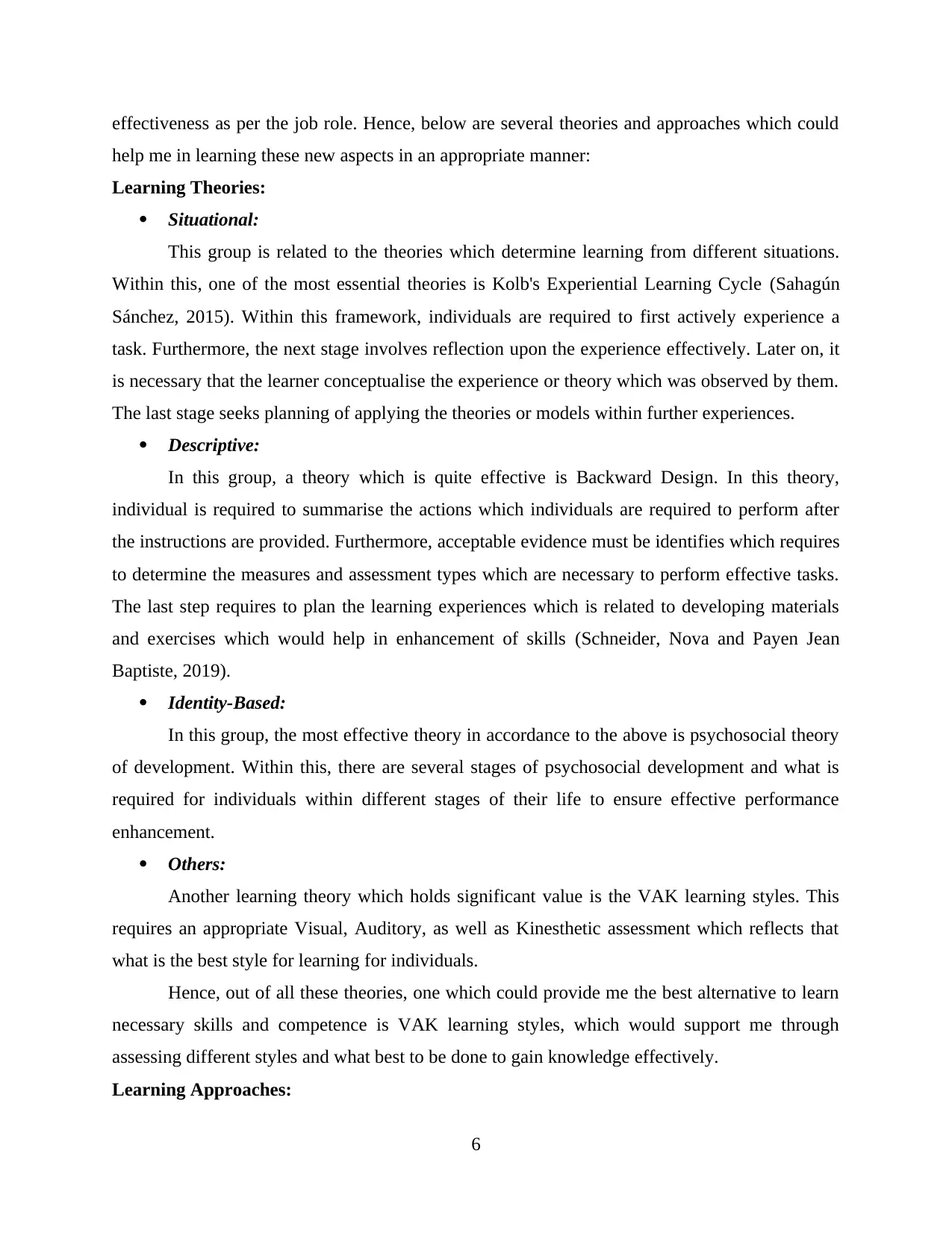
effectiveness as per the job role. Hence, below are several theories and approaches which could
help me in learning these new aspects in an appropriate manner:
Learning Theories:
Situational:
This group is related to the theories which determine learning from different situations.
Within this, one of the most essential theories is Kolb's Experiential Learning Cycle (Sahagún
Sánchez, 2015). Within this framework, individuals are required to first actively experience a
task. Furthermore, the next stage involves reflection upon the experience effectively. Later on, it
is necessary that the learner conceptualise the experience or theory which was observed by them.
The last stage seeks planning of applying the theories or models within further experiences.
Descriptive:
In this group, a theory which is quite effective is Backward Design. In this theory,
individual is required to summarise the actions which individuals are required to perform after
the instructions are provided. Furthermore, acceptable evidence must be identifies which requires
to determine the measures and assessment types which are necessary to perform effective tasks.
The last step requires to plan the learning experiences which is related to developing materials
and exercises which would help in enhancement of skills (Schneider, Nova and Payen Jean
Baptiste, 2019).
Identity-Based:
In this group, the most effective theory in accordance to the above is psychosocial theory
of development. Within this, there are several stages of psychosocial development and what is
required for individuals within different stages of their life to ensure effective performance
enhancement.
Others:
Another learning theory which holds significant value is the VAK learning styles. This
requires an appropriate Visual, Auditory, as well as Kinesthetic assessment which reflects that
what is the best style for learning for individuals.
Hence, out of all these theories, one which could provide me the best alternative to learn
necessary skills and competence is VAK learning styles, which would support me through
assessing different styles and what best to be done to gain knowledge effectively.
Learning Approaches:
6
help me in learning these new aspects in an appropriate manner:
Learning Theories:
Situational:
This group is related to the theories which determine learning from different situations.
Within this, one of the most essential theories is Kolb's Experiential Learning Cycle (Sahagún
Sánchez, 2015). Within this framework, individuals are required to first actively experience a
task. Furthermore, the next stage involves reflection upon the experience effectively. Later on, it
is necessary that the learner conceptualise the experience or theory which was observed by them.
The last stage seeks planning of applying the theories or models within further experiences.
Descriptive:
In this group, a theory which is quite effective is Backward Design. In this theory,
individual is required to summarise the actions which individuals are required to perform after
the instructions are provided. Furthermore, acceptable evidence must be identifies which requires
to determine the measures and assessment types which are necessary to perform effective tasks.
The last step requires to plan the learning experiences which is related to developing materials
and exercises which would help in enhancement of skills (Schneider, Nova and Payen Jean
Baptiste, 2019).
Identity-Based:
In this group, the most effective theory in accordance to the above is psychosocial theory
of development. Within this, there are several stages of psychosocial development and what is
required for individuals within different stages of their life to ensure effective performance
enhancement.
Others:
Another learning theory which holds significant value is the VAK learning styles. This
requires an appropriate Visual, Auditory, as well as Kinesthetic assessment which reflects that
what is the best style for learning for individuals.
Hence, out of all these theories, one which could provide me the best alternative to learn
necessary skills and competence is VAK learning styles, which would support me through
assessing different styles and what best to be done to gain knowledge effectively.
Learning Approaches:
6
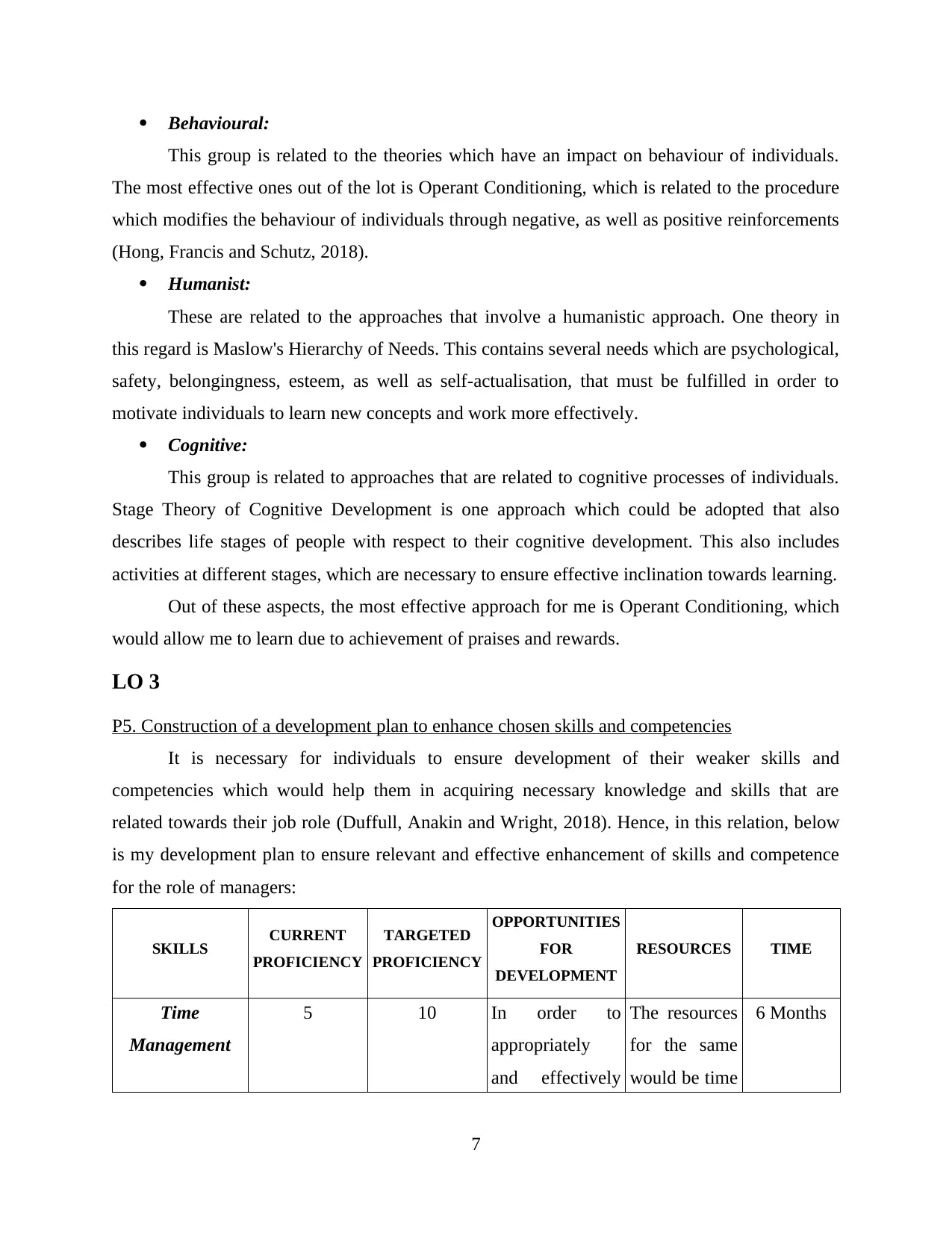
Behavioural:
This group is related to the theories which have an impact on behaviour of individuals.
The most effective ones out of the lot is Operant Conditioning, which is related to the procedure
which modifies the behaviour of individuals through negative, as well as positive reinforcements
(Hong, Francis and Schutz, 2018).
Humanist:
These are related to the approaches that involve a humanistic approach. One theory in
this regard is Maslow's Hierarchy of Needs. This contains several needs which are psychological,
safety, belongingness, esteem, as well as self-actualisation, that must be fulfilled in order to
motivate individuals to learn new concepts and work more effectively.
Cognitive:
This group is related to approaches that are related to cognitive processes of individuals.
Stage Theory of Cognitive Development is one approach which could be adopted that also
describes life stages of people with respect to their cognitive development. This also includes
activities at different stages, which are necessary to ensure effective inclination towards learning.
Out of these aspects, the most effective approach for me is Operant Conditioning, which
would allow me to learn due to achievement of praises and rewards.
LO 3
P5. Construction of a development plan to enhance chosen skills and competencies
It is necessary for individuals to ensure development of their weaker skills and
competencies which would help them in acquiring necessary knowledge and skills that are
related towards their job role (Duffull, Anakin and Wright, 2018). Hence, in this relation, below
is my development plan to ensure relevant and effective enhancement of skills and competence
for the role of managers:
SKILLS CURRENT
PROFICIENCY
TARGETED
PROFICIENCY
OPPORTUNITIES
FOR
DEVELOPMENT
RESOURCES TIME
Time
Management
5 10 In order to
appropriately
and effectively
The resources
for the same
would be time
6 Months
7
This group is related to the theories which have an impact on behaviour of individuals.
The most effective ones out of the lot is Operant Conditioning, which is related to the procedure
which modifies the behaviour of individuals through negative, as well as positive reinforcements
(Hong, Francis and Schutz, 2018).
Humanist:
These are related to the approaches that involve a humanistic approach. One theory in
this regard is Maslow's Hierarchy of Needs. This contains several needs which are psychological,
safety, belongingness, esteem, as well as self-actualisation, that must be fulfilled in order to
motivate individuals to learn new concepts and work more effectively.
Cognitive:
This group is related to approaches that are related to cognitive processes of individuals.
Stage Theory of Cognitive Development is one approach which could be adopted that also
describes life stages of people with respect to their cognitive development. This also includes
activities at different stages, which are necessary to ensure effective inclination towards learning.
Out of these aspects, the most effective approach for me is Operant Conditioning, which
would allow me to learn due to achievement of praises and rewards.
LO 3
P5. Construction of a development plan to enhance chosen skills and competencies
It is necessary for individuals to ensure development of their weaker skills and
competencies which would help them in acquiring necessary knowledge and skills that are
related towards their job role (Duffull, Anakin and Wright, 2018). Hence, in this relation, below
is my development plan to ensure relevant and effective enhancement of skills and competence
for the role of managers:
SKILLS CURRENT
PROFICIENCY
TARGETED
PROFICIENCY
OPPORTUNITIES
FOR
DEVELOPMENT
RESOURCES TIME
Time
Management
5 10 In order to
appropriately
and effectively
The resources
for the same
would be time
6 Months
7
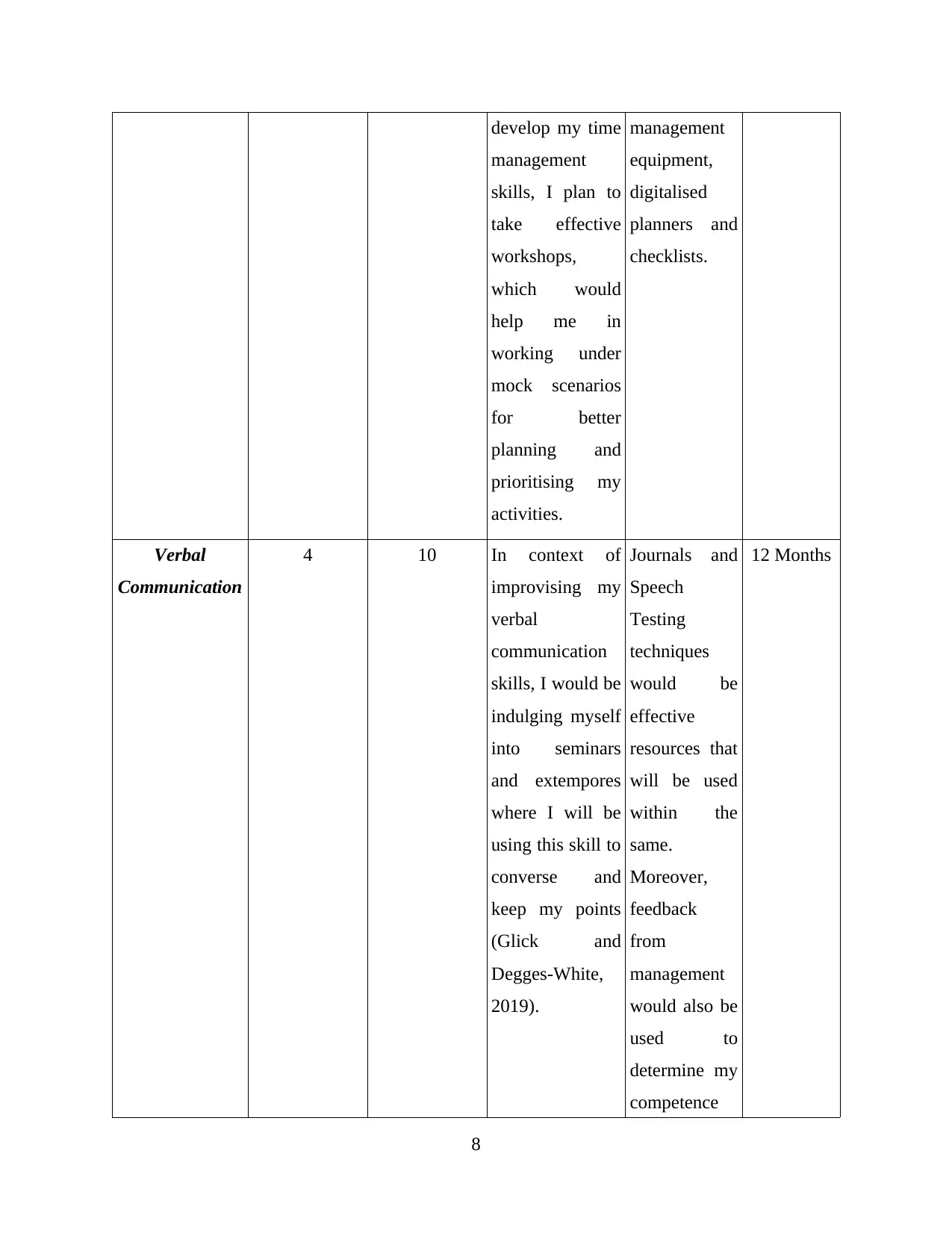
develop my time
management
skills, I plan to
take effective
workshops,
which would
help me in
working under
mock scenarios
for better
planning and
prioritising my
activities.
management
equipment,
digitalised
planners and
checklists.
Verbal
Communication
4 10 In context of
improvising my
verbal
communication
skills, I would be
indulging myself
into seminars
and extempores
where I will be
using this skill to
converse and
keep my points
(Glick and
Degges-White,
2019).
Journals and
Speech
Testing
techniques
would be
effective
resources that
will be used
within the
same.
Moreover,
feedback
from
management
would also be
used to
determine my
competence
12 Months
8
management
skills, I plan to
take effective
workshops,
which would
help me in
working under
mock scenarios
for better
planning and
prioritising my
activities.
management
equipment,
digitalised
planners and
checklists.
Verbal
Communication
4 10 In context of
improvising my
verbal
communication
skills, I would be
indulging myself
into seminars
and extempores
where I will be
using this skill to
converse and
keep my points
(Glick and
Degges-White,
2019).
Journals and
Speech
Testing
techniques
would be
effective
resources that
will be used
within the
same.
Moreover,
feedback
from
management
would also be
used to
determine my
competence
12 Months
8
Secure Best Marks with AI Grader
Need help grading? Try our AI Grader for instant feedback on your assignments.
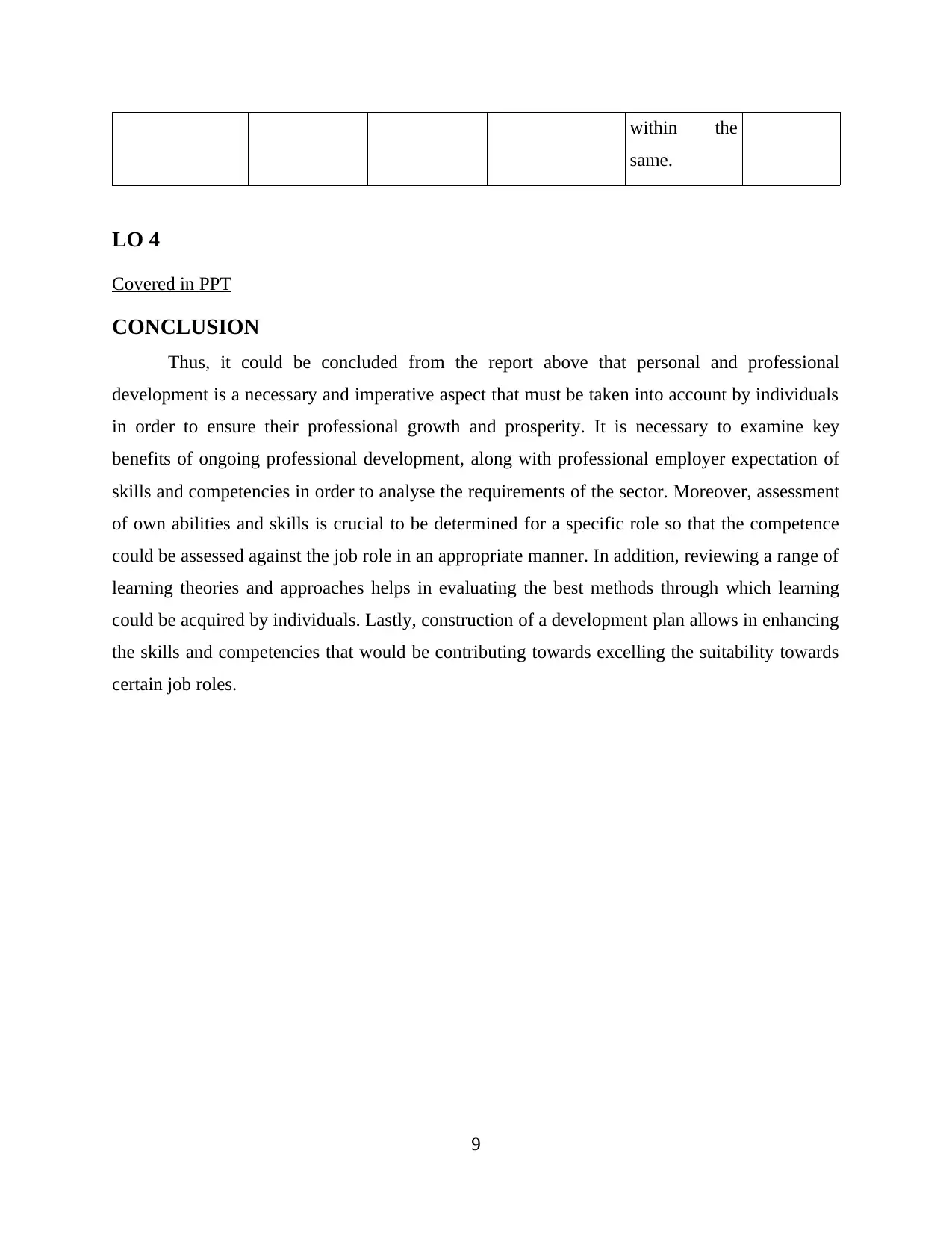
within the
same.
LO 4
Covered in PPT
CONCLUSION
Thus, it could be concluded from the report above that personal and professional
development is a necessary and imperative aspect that must be taken into account by individuals
in order to ensure their professional growth and prosperity. It is necessary to examine key
benefits of ongoing professional development, along with professional employer expectation of
skills and competencies in order to analyse the requirements of the sector. Moreover, assessment
of own abilities and skills is crucial to be determined for a specific role so that the competence
could be assessed against the job role in an appropriate manner. In addition, reviewing a range of
learning theories and approaches helps in evaluating the best methods through which learning
could be acquired by individuals. Lastly, construction of a development plan allows in enhancing
the skills and competencies that would be contributing towards excelling the suitability towards
certain job roles.
9
same.
LO 4
Covered in PPT
CONCLUSION
Thus, it could be concluded from the report above that personal and professional
development is a necessary and imperative aspect that must be taken into account by individuals
in order to ensure their professional growth and prosperity. It is necessary to examine key
benefits of ongoing professional development, along with professional employer expectation of
skills and competencies in order to analyse the requirements of the sector. Moreover, assessment
of own abilities and skills is crucial to be determined for a specific role so that the competence
could be assessed against the job role in an appropriate manner. In addition, reviewing a range of
learning theories and approaches helps in evaluating the best methods through which learning
could be acquired by individuals. Lastly, construction of a development plan allows in enhancing
the skills and competencies that would be contributing towards excelling the suitability towards
certain job roles.
9
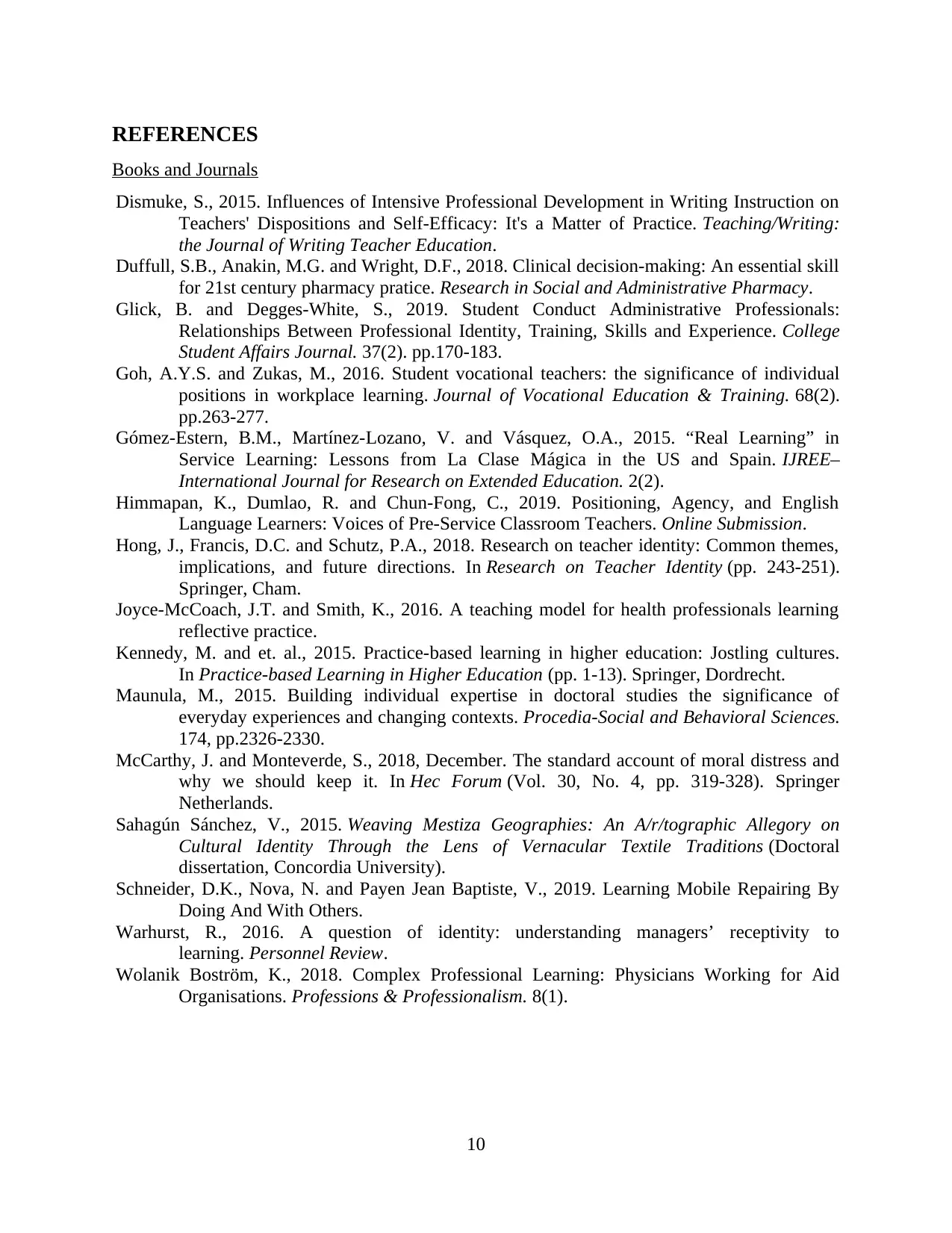
REFERENCES
Books and Journals
Dismuke, S., 2015. Influences of Intensive Professional Development in Writing Instruction on
Teachers' Dispositions and Self-Efficacy: It's a Matter of Practice. Teaching/Writing:
the Journal of Writing Teacher Education.
Duffull, S.B., Anakin, M.G. and Wright, D.F., 2018. Clinical decision-making: An essential skill
for 21st century pharmacy pratice. Research in Social and Administrative Pharmacy.
Glick, B. and Degges-White, S., 2019. Student Conduct Administrative Professionals:
Relationships Between Professional Identity, Training, Skills and Experience. College
Student Affairs Journal. 37(2). pp.170-183.
Goh, A.Y.S. and Zukas, M., 2016. Student vocational teachers: the significance of individual
positions in workplace learning. Journal of Vocational Education & Training. 68(2).
pp.263-277.
Gómez-Estern, B.M., Martínez-Lozano, V. and Vásquez, O.A., 2015. “Real Learning” in
Service Learning: Lessons from La Clase Mágica in the US and Spain. IJREE–
International Journal for Research on Extended Education. 2(2).
Himmapan, K., Dumlao, R. and Chun-Fong, C., 2019. Positioning, Agency, and English
Language Learners: Voices of Pre-Service Classroom Teachers. Online Submission.
Hong, J., Francis, D.C. and Schutz, P.A., 2018. Research on teacher identity: Common themes,
implications, and future directions. In Research on Teacher Identity (pp. 243-251).
Springer, Cham.
Joyce-McCoach, J.T. and Smith, K., 2016. A teaching model for health professionals learning
reflective practice.
Kennedy, M. and et. al., 2015. Practice-based learning in higher education: Jostling cultures.
In Practice-based Learning in Higher Education (pp. 1-13). Springer, Dordrecht.
Maunula, M., 2015. Building individual expertise in doctoral studies the significance of
everyday experiences and changing contexts. Procedia-Social and Behavioral Sciences.
174, pp.2326-2330.
McCarthy, J. and Monteverde, S., 2018, December. The standard account of moral distress and
why we should keep it. In Hec Forum (Vol. 30, No. 4, pp. 319-328). Springer
Netherlands.
Sahagún Sánchez, V., 2015. Weaving Mestiza Geographies: An A/r/tographic Allegory on
Cultural Identity Through the Lens of Vernacular Textile Traditions (Doctoral
dissertation, Concordia University).
Schneider, D.K., Nova, N. and Payen Jean Baptiste, V., 2019. Learning Mobile Repairing By
Doing And With Others.
Warhurst, R., 2016. A question of identity: understanding managers’ receptivity to
learning. Personnel Review.
Wolanik Boström, K., 2018. Complex Professional Learning: Physicians Working for Aid
Organisations. Professions & Professionalism. 8(1).
10
Books and Journals
Dismuke, S., 2015. Influences of Intensive Professional Development in Writing Instruction on
Teachers' Dispositions and Self-Efficacy: It's a Matter of Practice. Teaching/Writing:
the Journal of Writing Teacher Education.
Duffull, S.B., Anakin, M.G. and Wright, D.F., 2018. Clinical decision-making: An essential skill
for 21st century pharmacy pratice. Research in Social and Administrative Pharmacy.
Glick, B. and Degges-White, S., 2019. Student Conduct Administrative Professionals:
Relationships Between Professional Identity, Training, Skills and Experience. College
Student Affairs Journal. 37(2). pp.170-183.
Goh, A.Y.S. and Zukas, M., 2016. Student vocational teachers: the significance of individual
positions in workplace learning. Journal of Vocational Education & Training. 68(2).
pp.263-277.
Gómez-Estern, B.M., Martínez-Lozano, V. and Vásquez, O.A., 2015. “Real Learning” in
Service Learning: Lessons from La Clase Mágica in the US and Spain. IJREE–
International Journal for Research on Extended Education. 2(2).
Himmapan, K., Dumlao, R. and Chun-Fong, C., 2019. Positioning, Agency, and English
Language Learners: Voices of Pre-Service Classroom Teachers. Online Submission.
Hong, J., Francis, D.C. and Schutz, P.A., 2018. Research on teacher identity: Common themes,
implications, and future directions. In Research on Teacher Identity (pp. 243-251).
Springer, Cham.
Joyce-McCoach, J.T. and Smith, K., 2016. A teaching model for health professionals learning
reflective practice.
Kennedy, M. and et. al., 2015. Practice-based learning in higher education: Jostling cultures.
In Practice-based Learning in Higher Education (pp. 1-13). Springer, Dordrecht.
Maunula, M., 2015. Building individual expertise in doctoral studies the significance of
everyday experiences and changing contexts. Procedia-Social and Behavioral Sciences.
174, pp.2326-2330.
McCarthy, J. and Monteverde, S., 2018, December. The standard account of moral distress and
why we should keep it. In Hec Forum (Vol. 30, No. 4, pp. 319-328). Springer
Netherlands.
Sahagún Sánchez, V., 2015. Weaving Mestiza Geographies: An A/r/tographic Allegory on
Cultural Identity Through the Lens of Vernacular Textile Traditions (Doctoral
dissertation, Concordia University).
Schneider, D.K., Nova, N. and Payen Jean Baptiste, V., 2019. Learning Mobile Repairing By
Doing And With Others.
Warhurst, R., 2016. A question of identity: understanding managers’ receptivity to
learning. Personnel Review.
Wolanik Boström, K., 2018. Complex Professional Learning: Physicians Working for Aid
Organisations. Professions & Professionalism. 8(1).
10
1 out of 12
Related Documents
Your All-in-One AI-Powered Toolkit for Academic Success.
+13062052269
info@desklib.com
Available 24*7 on WhatsApp / Email
![[object Object]](/_next/static/media/star-bottom.7253800d.svg)
Unlock your academic potential
© 2024 | Zucol Services PVT LTD | All rights reserved.





